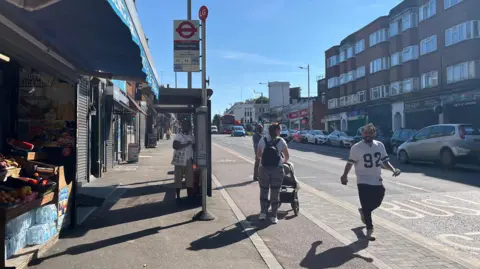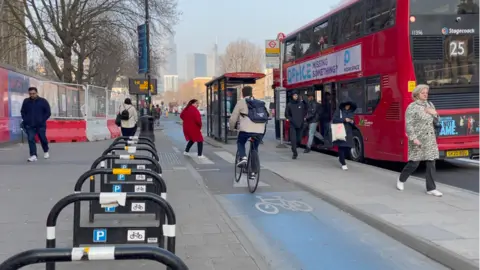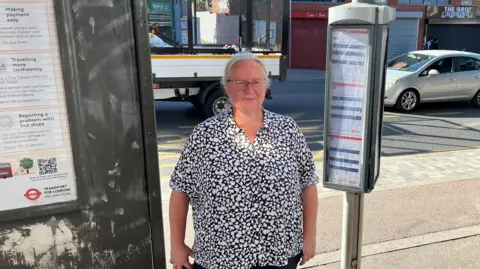Campaigners welcome new 'floating' bus stops pause
 BBC
BBCCampaigners have welcomed the government's decision to pause the rollout of one type of so-called floating bus stop, but said it "did not go far enough".
The design, which has a cycle lane between the stop and the kerb, is intended to allow bus passengers to get on and off safely while cyclists can continue moving.
Sarah Gayton, street access campaign coordinator at the National Federation of the Blind of the UK, told BBC London it was time to "go back to the drawing board and get better solutions for blind, visually impaired people, all bus passengers and cyclists".
A Department for Transport spokesperson said: "The safety and accessibility of our roads and pavements is an absolute priority."
They added: ""That's why the government will ask all local authorities in England to pause the implementation of bus stops where passengers step directly into cycle track."
There are currently 164 floating bus stops in the capital, London Assembly figures show.
 NFB
NFBThere are two different types of so-called floating bus stops:
- Shared Use Bus Border (SUBB) where the cycle lane runs across the front of the bus stop, between the shelter and the kerb where buses stop
- Bus stop bypasses where the bike track runs behind the bus stop/shelter
The government announcement on a pause refers to SUBBs. There are no SUBBs on Transport for London's (TfL) road network but many exist on roads managed by London boroughs.
The borough with the most floating bus stops is Tower Hamlets (34), followed by Waltham Forest (19) and Southwark (16).

Ms Gayton said she wanted the introduction of all types of floating bus stop to be halted.
She said: "They're an absolute nightmare because if it's a SUBB, you have to board the bus directly from a cycle lane, or you have to get off into a cycle lane.
"If you think that a blind person's got a white cane, you have to put your cane right out so it could be hit, it could be broken, it could be snatched out of your hand by a cyclist.
"If you've got a guide dog, the guide dog sort of launches you forward down into the cycle lane and you can't see them [cyclists], you cannot hear them.
"A lot of blind people rely on their hearing so it's like playing Russian roulette because we know the majority of cyclists simply don't stop at these floating bus stops."
In a written answer to Parliament last month, Simon Munk, head of campaigns and community development at the London Cycling Campaign, denied suggestions that floating bus stops were dangerous.
He said: "Indeed, they appear to have very low collision rates, and are safer for pedestrians than many other road features not under scrutiny in general – side road entrances, zebra crossings, signalised junctions, pedestrian refuges etc.
"While the lived experience of visually impaired and other groups of people finding floating bus stops difficult to navigate is clear and important to consider, there is no evidence that visually impaired, other disabled or elderly people are finding floating bus stops so difficult to navigate that they are avoiding them."
In a written answer to the London Assembly in May, the mayor of London stated: "TfL is awaiting further information from the Department for Transport regarding the proposed pause to the delivery of SUBBs across the country.
"Once it has more information, it will carefully consider the implications for London and work with London borough councils to consider the appropriate next steps.
"In the meantime, TfL is talking directly to boroughs with planned SUBBs to understand the current status of such works."
Listen to the best of BBC Radio London on Sounds and follow BBC London on Facebook, X and Instagram. Send your story ideas to [email protected]
